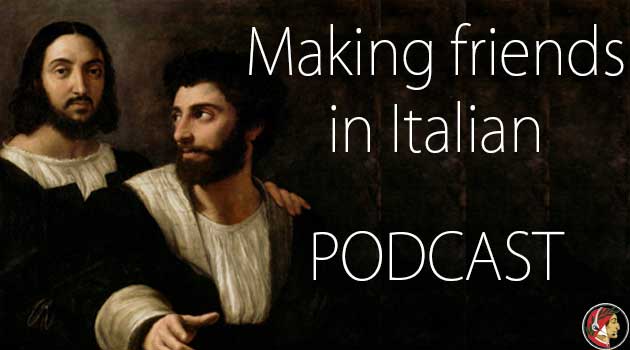Addressingpeopleformallyandinformally,greetingsandintroductions.Listentothepodcast.
ThePodcastisaboutmakingfriendsandstartingaconversation.
InItalian,wehavetwodifferentlevels ofcommunication:formalandinformal.Whenwewantto addresssomeoneinformally,weusethepronounTU(you).OntheotherhandtheformalpronounisLEI(she)usedforbothmenandwomen.ThefirstoneisequivalenttotheEnglishYOU,sothere’snoproblemhere.TheLEI isaformofrespectthat createsdistancebetweenspeakers.Forexample:
- Cometichiami(tu)?
- Comesichiama(lei)?
Theybothmeanwhat’syourname,butthelatterismoreappropriateifyouspeaktoanadultyoudon’tknow,orneedtopayrespecttosomeone. Forexample,IknowmanypeopleusingtheLeiwiththeirparentsinlaw,theirbossesandcolleaguesatwork,theircustomers.Itdependsonthesituation.
SometimestheLeiis notnecessarybecause thenature oftherelationshipisinformal.Italiansarefriendly,somostprobablytheLeiwillbe necessaryonlywhenyouintroduceyourself.YouwillsoonusetheinformalTu.
Sinceyouareaforeigner,people willunderstandit’sdifficultforyoutousetheLei.Inanycase,it’srecommendedtoshowsomepolitenessandlearngreetingsandintroductionsusing Lei.Then,youcanasktoswitchtotheinformalTusaying:
- Diamocideltu.
- Possiamodarcideltu?
Let’sproceedwithorder:
ItaliansusetitlesmorethanEnglishspeakers.Thefollowingisthebasics:
- Signore-Sir
- Signora-Ma’am
- Signorina-Miss
- SignorRossi-Mr.Rossi
- SignoraBianchi-Mrs.Bianchi
- SignorinaFerrari-MissFerrari
Ontopofit,people tendtogivealotofimportancetograduatedprofessionals.EveryItalianholdingauniversitydegreeisadottore ifmaleordottoressa if femaleandthetitleis usedinsteadofsignororsignorabeforethelastname,evenoutsidetheworkingenvironment.Themostcommonare:
- DottorRossi
- DottoressaBianchi
- AvvocatoMartini
- ProfessorArmani
- ProfessoressaLamborghini
- IngegnerCampari
Youcanseethattitlesformalesendingin”e”,dropthe”e”beforethelastname.SignorebecomesSignorRossi,DottorebecomesDottorRossiandsoon.
GreetingsinItalianfollowthesamesimplerulesyouhaveinEnglish.Theycanbeformal,informal,commonorlesscommondependingonthesituation.Downbelowthemostcommon.
- Buongiorno-Goodmorning,butalsogoodafternoonuntildusk
- Buonpomeriggio-Goodafternoon,notascommonasBuongiorno
- Buonasera-Goodevening
- Buonanotte-Goodnight
- Buonagiornata-Haveagoodday
- Buonaserata-Haveagoodevening
These canbeusedinformalandinformalsituationsand areallratherpolite.I’drarely saybuonasera toaclosefriend.
- Ciao-Hi
- Salve-Hello
Ciao iswhatIwouldsaytoafriendorarelative.It’dbevery rudetosayciaotoapersonwho deservestheformalLei.
Salve istheformal versionofciao. Useitwhennecessary.
- Arrivederci-Seeyou.
- Civediamo-Seeyou.
- Cisivede-We’llseeeachother.
- Cisentiamo-Speaktoyousoon.
- Apresto-Seeyousoon.
- Adomani-Seeyoutomorrow.
- Allaprossima-Seeyounexttime.
- Adopo-Seeyoulater.
- Benvenuto/Benvenuta/Benvenuti-Welcome.
Arrivederciisquiteformal.It’soktouseitwiththeLeiform.SamewithApresto.Alltheothersareratherconversationalandinformal.Cisentiamo ismorelike”we’llhearfromeachother”.
Youprobablylearnedthat”Michiamo…”means”Mynameis…”.Right,buttheliteraltranslationis “Icallmyself…”.Chiamarsiisa
- Iomichiamo-
- Tutichiami-
- Lui/Leisichiama-
- Noicichiamiamo-
- Voivichiamate-
- Lorosichiamano-
Ifyouwanttoask”what’syourname”youhavetwooptions
- Cometichiami(tu)?Informal
- Comesichiama(lei)?Formal
Rememberthatwecanomitthesubject,soit’snotnecessarytosayTuorLeilikeinEnglish.Thepersonwouldanswer”Michiamo…”orsimplysayhisorhername.
Wecansay”nicetomeetyou”indifferentways:
- Piacerediconoscerla-“Pleasure toknowyou”-Lei,formal
- Ciao,piacere-Hi,pleasure-Tu,informal
- Moltopiacere-Muchpleasure-Verypolite,impersonal
Ifyouintroducesomeoneelsetosomepeople,therearetheusualtwooptions:
- LepresentoilDottorBianchi-Iintroducetoyou(Lei)Dr.Bianchi
- TipresentolamiaamicaLucia-Iintroducetoyou(Tu)myfriendLucia
- VipresentoIlsignorMartini-IintroducetoyouMr.Martini(voi,youplural)
Thepodcastandexamplesabovearebasic.Itwouldbeenoughtogetyoustarted.Downbelow,moreexamples.
- Buongiornodottore,comesta?
- Miscusi, sacheoresono?
- Doveabita?
- Dov’èilsuoalbergo?
- Chelavorofa?
- Laringrazio.
- Leihafigli?
- Possoaiutarla?
- Buongiorno Marco,comestai?
- Scusami, saicheoresono?
- Doveabiti?
- Dov’èiltuoalbergo?
- Chelavorofai?
- Ti ringrazio.
- Tu haifigli?
- Possoaiutarti?
- Goodmorning,howareyou?
- Excuseme,whattimeisit?
- Wheredoyoulive?
- Whereisyourhotel?
- What’syourjob?
- Thankyou.
- Doyouhavechildren?
- CanIhelpyou?
Inred,theLEIversion,inbluetheTUversion.ThesearejustafewexamplesandshowhowafewwordsinItaliancanchangethetoneandthelevelofrespect in aconversation.Thesesentencesmaybeuseful asice-breakersforstartingaconversation.
Allthefollowingexamplesarewiththecourtesyform”Lei”.
- BuonNataleSignorRossi.
- AvvocatoBerlusconi,acheoraciincontriamo?
- Chiedoscusasignorina,habisognodiaiuto?
- SignoraMartini,sacheoresono?
- Ingegnere,hacompletato quelprogetto?
- Miscusisignore,hapersolechiavi.
- VorreiparlareconilprofessorCampari. Èdisponibile?
- DottoressaBianchi,ammiromoltoilsuolavoro.
- LepresentoilsignorBonaventura.
- MerryChristmas,Mr.Rossi.
- AvvocatoBerlusconi,whattimeshallwemeet?
- IbegyourpardonMiss,doyouneedanyhelp?
- MrsMartini,doyouknowwhattimeisit?
- Ingegnere,haveyoufinishedthatproject?
- ExcusemeSir,youhavelostyourkeys.
- IwouldliketotalktoProfessorCampari,isheavailable?
- DottoressaBianchi,Iadmireverymuchyourwork.
- LetmeintroduceMr.Bonaventura.
- Buongiornoatutti!
- Buonpomeriggiosignora,possoaiutarla?
- Buonasera Franco,comeva?
- Buonanotteesognid’oro.
- Buonagiornata ebuonlavoro.
- Buonaserataebuondivertimento.
- CiaoLuca,daquantotempo!
- SalvesignoraRossi,imieisalutiasuomarito.
- Arrivederci eapresto.
- Civediamolasettimanaprossima.
- GraziemilleMichela,cisivede.
- CiaoGiulia,apresto.
- Graziemilleperlabellaserata.Cisivede.
- BenvenutiinItalia!
- Goodmorningeveryone.
- GoodafternoonMa’am,canIhelpyou?
- GoodeveningFranco,howisitgoing?
- Goodnightandsweetdreams
- Haveagooddayandagoodtimeatwork.
- Goodeveningandhavefun.
- CiaoLuca, longtimenosee!
- SalvesignoraRossi,myregardstoyourhusband.
- Seeyousoon.
- Seeyounextweek.
- ThanksalotMichela,I’llseeyou.
- Bye Giulia,seeyousoon.
- Thanksalotforthelovelyevening.We’llseeagain.
- WelcometoItaly!
Theseareformalandinformalgreetingsandfarewells.Theexpression”buonlavoro”doesn’treallyhaveanequivalent inEnglish.It’safarewell,inthiscaseitdoesn’tmean”goodjob!”.
- MichiamoLuca,piacere.
- TichiamiFabio,vero?
- LuisichiamaStefano,èunmioamico
- Comesichiama latuaamica?
- Piacerediconoscerla dottoressaFerrari.
- Piacerediconoscerti,michiamoDario.
- Piaceremio.
- PossopresentarleilprofessorBianchi?
- PossopresentartiLaura,lamiaragazza?
- Viconoscetegià?
- MynameisLuca,nicetomeetyou.
- YournameisFabio,right?
- He’sStefano,afriendofmine.
- What’sthenameofyourgirlfriend?
- PleasedtomeetyoudoctorFerrari(woman)
- Nicetomeetyou,mynameisDario
- Mypleasure.
- MayIintroduceprofessorBianchi?
- CanIintroduce Gianni,myboyfriend?
- Doyoualreadyknoweachother?
Thanksforreading!

